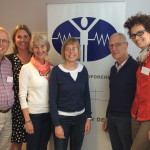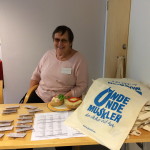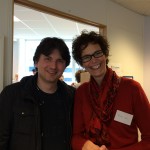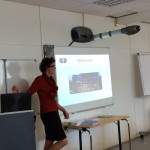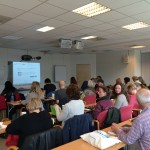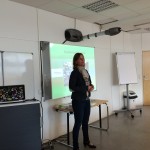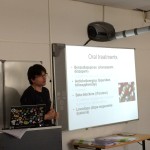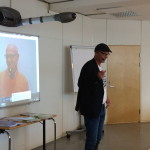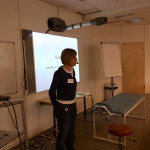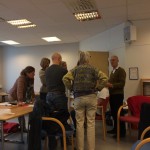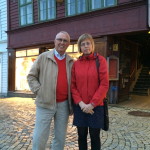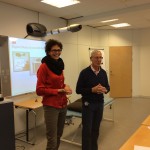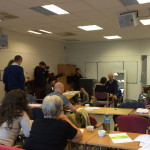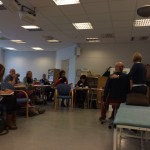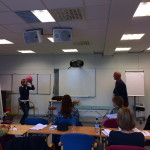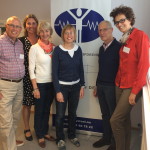Last year NDF – the Norwegian Dystonia Association – received a grant of approximately
€ 55 000 to run workshops in physiotherapy for cervical dystonia. The launch of the three-year project took place last Thursday in Bergen, Norway. About 20 physiotherapists from the region had come to the FFO centre to learn about how to treat cervical dystonia. Day one focussed on presentations on dystonia and its clinical features, the different types of dystonias and the treatments available, given by neurologists Jeanette Koth from Drammen Hospital and Charalampous Tzoulis of Haukeland University Hospital in Bergen. The day ended with Physiotherapist Johanna Blom from Malmö University Hospital in Sweden who together with a dystonia patient gave a thorough demonstration of how it is when she sees a dystonia patient for the first time, what questions she asks and how she examines the patient.
Day two was all about physiotherapy for cervical dystonia. Physiotherapist Jean-Pierre Bleton from Rothschild Foundation in Paris, presented four different patient cases. While examining the patients and identifying the dystonic mucsles he explained to the audience his way of thinking when deciding on the objectives, as well as the strategy, of each individual training program. After lunch physiotherapist Johanna Blom continued and showed more exercises together with some patients. She stressed that training should be fun and you can for example use a ball, try dance movements or some other activity that you enjoyed before the dystonia. Both Jean-Pierre and Johanna stressed the importance of physiotherapy in combination with botulinum toxin treatment, and for the best result it is important for the patient to follow a home training program.
Dystonia Europe Executive Director Monika Benson was together with SDF – the Swedish Dystonia Association – Chairman Göran Olsson invited to attend the meeting. Göran tells us that SDF has successfully arranged a one-day course on physiotherapy for cervical dystonia for the last three years and the 4th course will be held in Stockholm beginning of September this year. “I am thrilled to see that Norway now also is organizing courses in physiotherapy for cervical dystonia. To achieve the best treatment results it is extremely important that cervical dystonia patients can see a physiotherapist who knows how to treat dystonic muscles.”
A great thank you to Anniken Hagen for her fantastic work to launch this project in Norway and Dystonia Europe wishes her and NDF good luck and we look forward to follow the development of the project. Already next week the second course will take place in Oslo.
- Göran Olsson SDF, Swedish Dystonia Association, Neurolgoist Jeanette Koth, Dystonia Europe Monika Benson, Phyisotherapists Johanna Blom & Jean-Pierre Bleton and NDF Chairwoman Anniken Hagen
- NDF member Reidunn Bjorg Loland at the registration desk.
- Participants registering and being welcomed by Anniken.
- Neurologist Charalampous Tzoulis & Anniken Hagen.
- NDF Chairwoman Anniken Hagen welcoming everybody…
- Twenty physiotherapists in the audience.
- Neurologist Jeanette Koth
- Neurologist Charalampous Tzoulis
- NDF member John Berget telling his dystonia story.
- Physiotherapist Johanna Blom
- Working in small groups, here with physiotherapist Jean-Pierre Bleton demonstrating his examination techniques.
- From Sweden: SDF Chairman Göran Olsson and Physiotherapist Johanna Blom
- Anniken Hagen and Jean-Pierre Bleton
- Patient demonstration with Jean-Pierre Bleton
- Patient demonstration with Johanna Blom
- Training should be playful – why not use a pink ball?
- Or a special NDF ball?
- Conference bag says: “Bad, bad muscles, you don’t want to have!”
- Guests, Trainers and a very happy Chairwoman Anniken Hagen.
